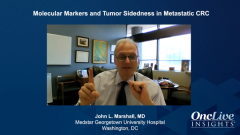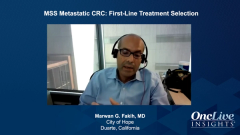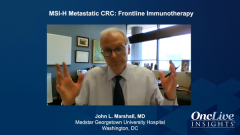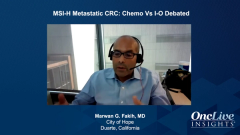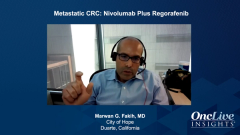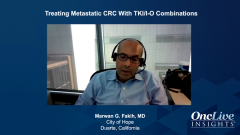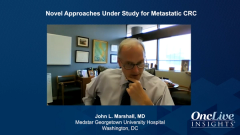
MSI-H Metastatic CRC: Frontline Immunotherapy
Considerations for frontline immunotherapy for patients with microsatellite instability high metastatic colorectal cancer based on data from the KEYNOTE-177 and CheckMate 142 studies.
Episodes in this series

John L. Marshall, MD: Joleen, take us to this other small section of the pie—those patients with metastatic colorectal cancer who are MSI [microsatellite instability]-high. Maybe you can walk us through some of the studies that support this new frontline approval?
Joleen M. Hubbard, MD: So this year at ASCO [American Society of Clinical Oncology], we did see updated results on KEYNOTE-177, which is the frontline study of pembrolizumab versus standard of care chemotherapy plus a biologic for patients with metastatic colorectal cancer. Again, it confirms that starting with upfront immunotherapy can lead to higher response rates. Also, you’re doubling the progression-free survival from around 8 months to over 16 months.
Overall survival was not even reached in the pembrolizumab arm, but it was still pretty good, with over a 36-month overall survival for the standard of care arm.
We also saw improved response rates. Some patients started with chemotherapy and then moved to immunotherapy. We saw improved response rates and improved second progression-free survival rates. So I think this year’s ASCO really just reaffirmed the use of pembrolizumab upfront in the first-line setting.
Now, going back to ASCO GI [American Society of Clinical Oncology Gastrointestinal Cancers Symposium], we also had the update of the CheckMate 142 study, which combined ipilimumab with nivolumab. This combination was compared to single-agent nivolumab. Although this was not a randomized comparison, we saw improved response rates and improved disease control in terms of progression-free survival with the combination ipilimumab/nivolumab. And interestingly, there wasn’t much more toxicity associated with the combination of checkpoint inhibitors. Heinz-Josef Lenz, MD, FACP, who is the lead author on the study, is a firm believer in using the dual checkpoint inhibition for these patients in the first-line setting.
Without a randomization, I don’t know that it’s fair to say that it’s definitely better. But just looking at the studies, looking at CheckMate 142, it does look promising that we may be able to improve the outcomes in MSI-high colorectal cancer without causing a tremendous amount of toxicity.
John L. Marshall, MD: Thank you. That’s a great summary.
Transcript Edited for Clarity


